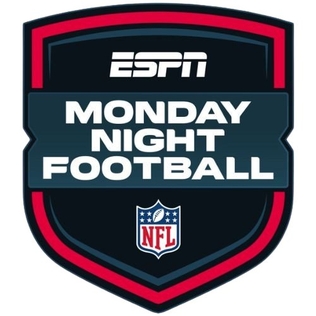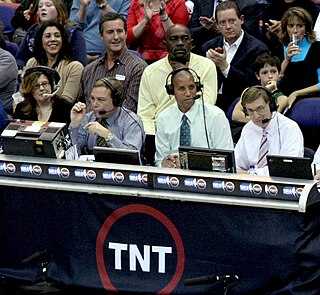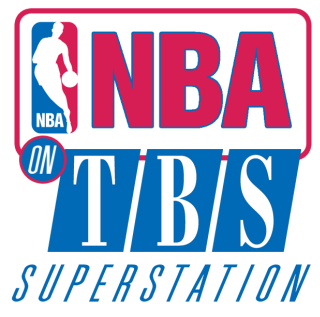
Monday Night Football is the branding used for broadcasts of National Football League (NFL) games that primarily broadcast on Monday nights. It was originally broadcast on ABC from 1970 to 2005, before moving exclusively to sister network ESPN in 2006, which remains the main channel for the broadcast. In 2020, MNF returned to ABC in select simulcasts with ESPN, and in 2022, it began featuring select exclusive ABC telecasts. In addition, ESPN2 has aired alternate telecasts of selected games since 2020 as the Manningcast, while ESPN+ has streamed MNF simulcasts in the United States since 2021.
ESPN on ABC is the branding used for sports event and documentary programming televised by the American Broadcasting Company (ABC) in the United States. Officially, the broadcast network retains its own sports division; however, in 2006, ABC's sports division was merged into ESPN Inc., which is the parent subsidiary of the cable sports network ESPN that is majority owned by ABC's corporate parent, The Walt Disney Company, in partnership with Hearst Communications.

The NBA on NBC is the branding used for presentations of National Basketball Association (NBA) games produced by the NBC television network in the United States. NBC held broadcast rights from 1954 to 1962 and again from 1990 to 2002. During NBC's partnership with the NBA in the 1990s, the league rose to unprecedented popularity, with ratings surpassing the days of Magic Johnson and Larry Bird in the mid-1980s. Although the main NBC network no longer airs NBA broadcasts, NBA games currently air on the NBC Sports Regional Networks in the form of game telecasts that air on a regional basis, featuring local NBA teams that each of the regional networks have respective broadcast rights to air in their designated market.
Nationally television broadcasts of National Basketball Association (NBA) games first aired on ABC from 1965 to 1973. In 2002, NBA games returned to ABC as part of a contract signed with the league, along with cable sister network ESPN. After the ABC Sports division was merged into ESPN Inc. by parent company Disney in 2006, broadcasts have since been produced by ESPN, and have primarily used the NBA on ESPN branding and graphics instead of the NBA on ABC branding.

The NBA on CBS is the branding that is used for weekly broadcasts of National Basketball Association (NBA) games produced by CBS Sports, the sports division of the CBS television network in the United States. CBS aired NBA games from the 1973–74 NBA season until the 1989–90 NBA season.

NBA on TNT is an American presentation of National Basketball Association (NBA) games, produced by TNT Sports. In the United States, the TNT cable network has held the rights to broadcast NBA games since 1989, and its telecasts have been streamed on its Max platform since 2023. TNT's NBA coverage includes the Inside the NBA studio show, weekly doubleheaders throughout the regular season on Tuesdays and Thursdays, a majority of games during the first two rounds of the playoffs, and one conference finals series.

National Basketball Association (NBA) games are televised nationally in the United States, as well as on multiple local channels and regional sports networks. Since the 2002–03 season, broadcast channel ABC, and pay TV networks ESPN and TNT have nationally televised games. Throughout most of the regular season, ESPN shows doubleheaders on Wednesday and Friday nights, while TNT shows doubleheaders on Tuesday and Thursday nights. In the second half of the season, ABC shows a single game on Saturday nights and Sunday afternoons. Games are shown almost every night on NBA TV. There are some exceptions to this schedule, including Tip-off Week, Christmas Day, and Martin Luther King Jr. Day. More games may be shown as the end of the regular season approaches, particularly games with playoff significance. During the playoffs, the first round are split between TNT, ESPN, NBA TV, and ABC on mostly weekends the second round are split between ESPN, TNT and ABC on weekends. The conference finals are split between ESPN/ABC and TNT; the two networks alternate which complete series they will carry from year to year. The entire NBA Finals is shown nationally on ABC. The NBA Finals is one of the few sporting events to be shown on a national broadcast network on a weeknight.

"Remember the Name" is a song by Fort Minor, the hip hop side project of rock band Linkin Park's co-lead vocalist Mike Shinoda. It is the second single from his 2005 album The Rising Tied and features underground hip hop band Styles of Beyond. It was released alongside the album's first single, "Petrified". A music video for the song was directed by Kimo Proudfoot.

The NBA on ESPN is the branding used for the presentation of National Basketball Association (NBA) games on the ESPN family of networks. The ESPN cable network first televised NBA games from 1982 until 1984, and has been airing games currently since the 2002–03 NBA season. ESPN2 began airing a limited schedule of NBA games in 2002. ABC began televising NBA games under full ESPN production in 2006. On October 6, 2014, ESPN and the NBA renewed their agreement through 2025.

The NBA on TBS is an American presentation of National Basketball Association (NBA) regular season and playoff game telecasts that aired on the American cable and satellite network TBS. The games were produced by Turner Sports, the sports division of the Turner Broadcasting System subsidiary of Time Warner, TBS's corporate parent.
"Roundball Rock" is a musical score composed by John Tesh and used for The NBA on NBC from 1990 until 2002. NBC played the theme 12,000 times during their run. Tesh came up with the melody while at a hotel and called his answering machine at home to sing a preliminary version of the melody so he would not forget it. A more rock-oriented variant was introduced in 1997 to coincide with the debut of the WNBA. That theme was also used until 2002, and on NBC's WNBA telecasts only. Since 2018, it has been used as the theme song for CBB on FOX.
Games held by the National Basketball Association (NBA) on Christmas Day, December 25, have been an annual tradition since the league's second season in 1947. Since 2008, five games have been played on Christmas. Unlike the National Football League (NFL)'s traditional Thanksgiving Day games, the NBA's Christmas Day games have no fixed opponents; rather, they feature some of the best teams and players. Since 1995, the current NBA champions play a game on Christmas Day.

NCAA March Madness is the branding used for coverage of the NCAA Division I men's basketball tournament that is jointly produced by CBS Sports, the sports division of the CBS television network, and TNT Sports, the national sports division of Warner Bros. Discovery (WBD) in the United States. Through the agreement between CBS and WBD, which began with the 2011 tournament, games are televised on CBS, TNT, TBS and truTV. CBS Sports Network has re-aired games from all networks.
As the national broadcaster of the NBA, CBS aired NBA games from the 1973–74 until the 1989–90 season, during which the early 1980s is notoriously known as the tape delay playoff era.
As the national broadcaster of the NBA, CBS aired NBA games from the 1973–74 until the 1989–90 season, during which the early 1980s is notoriously known as the tape delay playoff era.
As the national broadcaster of the NBA, CBS aired NBA games from the 1973–74 until the 1989–90 season, during which the early 1980s is notoriously known as the tape delay playoff era.
Upon expiration of the contract in 2002, the league signed an agreement with ABC, which began airing games in the 2002-03 season. NBC had made a four-year $1.3 billion bid in the spring of 2002 to renew its NBA rights, but the league instead went to ESPN and ABC with a six-year deal worth $2.4 billion, a total of $4.6 billion when adding the cable deal with Turner Sports.
NBC made history in the 1980s with an announcerless telecast, which was a one-shot experiment credited to Don Ohlmeyer, between the Jets and Dolphins in Miami on December 20, 1980), as well as a single-announcer telecast, coverage of the Canadian Football League during the 1982 players' strike, and even the first female play-by-play football announcer, Gayle Sierens.
On March 12, 1990, at the NFL's annual meeting in Orlando, Florida, the league new ratified four-year television agreements for the 1990 to 1993 seasons involving ABC, CBS, NBC, ESPN and TNT. The contracts totaled US$3.6 billion, the largest package in television history. This contract saw each network having rights to one Super Bowl telecast as part of the package. The fourth Super Bowl (XXVIII) was up for a separate sealed bid. NBC won the bid, and since they were last in the rotation for Super Bowl coverage in the regular contract, ended up with two straight Super Bowls. CBS is the only other network to televise two Super Bowls in a row. NBC, which had held XXVII, was the only network to bid on XXVIII. Previously, the league alternated the Super Bowl broadcast among its broadcast network partners, except for Super Bowl I; CBS broadcast Super Bowl II, then the league rotated the broadcast between CBS and NBC until 1985 when ABC entered the rotation when that network broadcast Super Bowl XIX.









